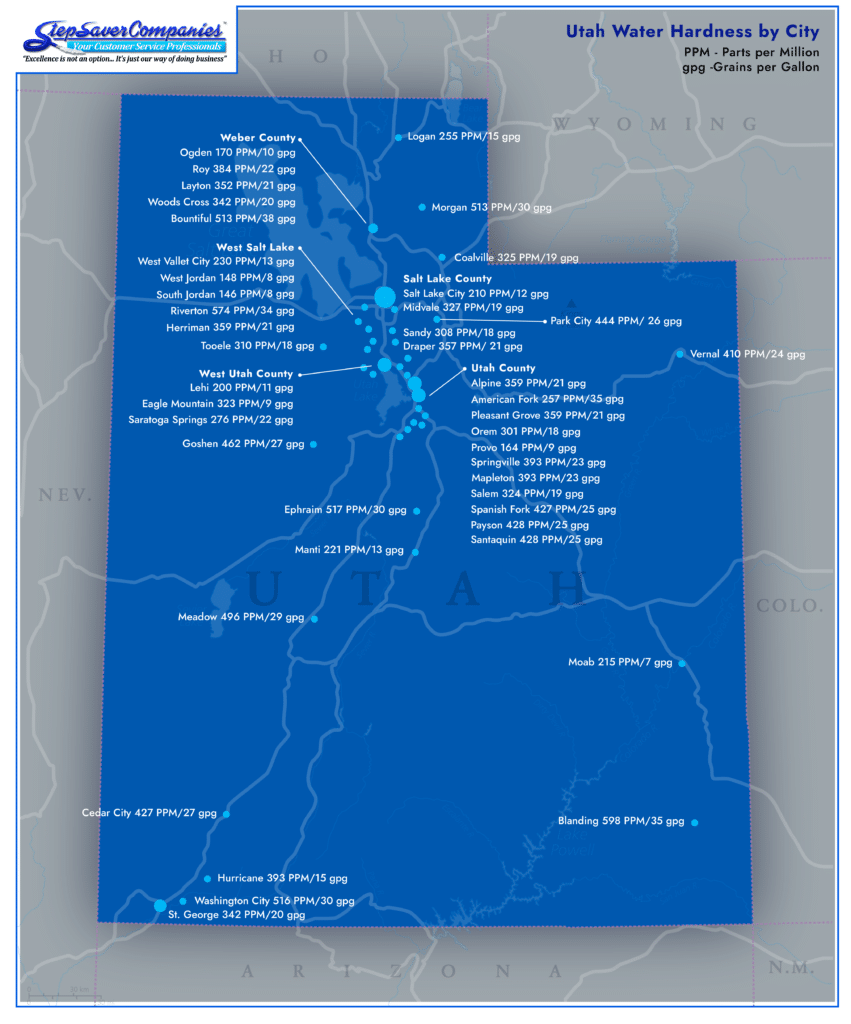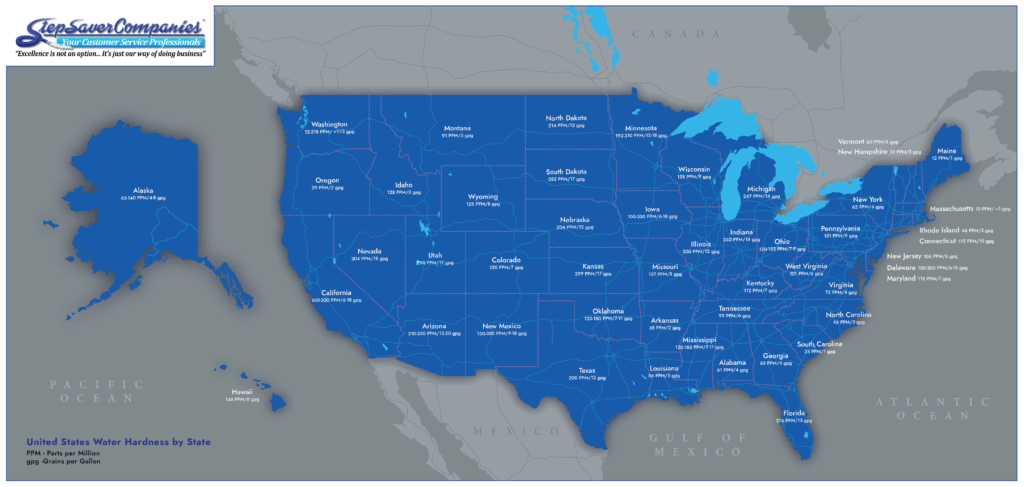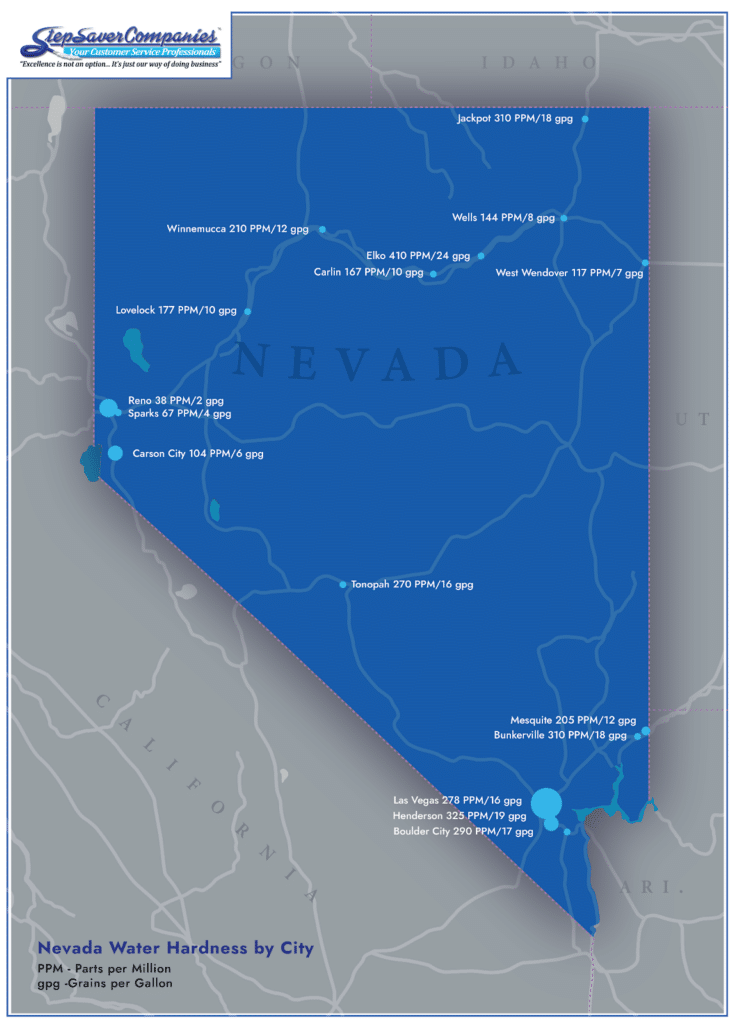Utah is known for its stunning landscapes, but there’s something less appealing hiding in our water—high mineral content. Hard water is a common issue across the state, affecting both homes and businesses. From stubborn scale buildup on fixtures to reduced efficiency in water-based systems, the consequences of hard water can add up quickly. In this blog, we’ll break down Utah’s water hardness levels by region and zip code, explain why it’s so high, and explore what you can do to protect your property with effective water treatment solutions.
Does Utah Have Hard Water?
Unfortunately, Utah generally has very hard water. The average hardness levels in the Beehive State are about 298 parts per million (PPM). These measurement units represent the concentration of dissolved minerals in the water. For instance, 200 ppm means that 200 milligrams of calcium carbonate are dissolved in 1 liter of water. Another measurement used, which we’ll reference below, is grains per gallon (GPG) representing the amount of dissolved minerals in a gallon of water. The higher the measurements, the more minerals are present, which makes Utah’s water hardness levels unusually elevated.
Utah’s Water Hardness Level By City
Utah’s water hardness levels vary significantly depending on location, with some areas experiencing moderate hardness while others face extremely hard water. For example, Salt Lake City’s water measures around 210 PPM, which is considered moderately hard. On the other hand, cities like St. George can reach levels as high as 342 PPM, placing them in the very hard water category.
Check the map below to see how Utah’s water hardness in your area compares. Understanding the hardness level in your city is the first step in determining the right water treatment solution for your home or business:

What Causes Utah’s Hard Water?
So, why are Utah’s water hardness levels higher than other states? There are multiple reasons why this state has abnormally hard water:
Rock Formations: Utah is widely recognized for its breathtaking rock formations. This geological makeup, while beautiful, can contribute to the presence of high levels of magnesium and calcium ions in the water. As water flows through limestone and chalk, it picks up calcium carbonate, which makes the water harder.
Rainfall: As rain falls, it passes through Utah’s mineral-rich soil and rocks, picking up natural deposits of calcium, magnesium, and other minerals. This mineral-laden water eventually makes its way into the state’s rivers, streams, and groundwater, significantly contributing to Utah’s hard water.
Soil Composition: Utah’s soil is unusually rich in minerals, particularly calcium and magnesium, which are the primary contributors to water hardness.
Low Rainfall and High Mineral Concentration: Utah’s arid climate means less frequent rainfall, reducing the dilution of minerals in groundwater. This causes a higher concentration of minerals, resulting in harder water compared to areas with more abundant rain.
Hard water can have several consequences for businesses and homes in Utah. From scale buildup on appliances and fixtures to clogged pipes, hard water can reduce the efficiency and lifespan of water-based systems. It can also lead to higher energy bills, unsafe drinking water for employees or residents, increased maintenance costs, and issues with soap scum or reduced lathering of cleaning products. Over time, these problems can impact daily life and business operations, making water treatment solutions essential.
How to Solve the Hard Water Issue in Utah: 3 Tips
For businesses and homeowners in Utah, addressing hard water is essential to protect plumbing systems, reduce maintenance costs, and improve water quality. The good news is that several effective solutions can mitigate the effects of hard water and prevent long-term damage:
1. Install a Water Softener System
Water softeners are one of the most common and effective ways to combat hard water. These systems use ion exchange to remove calcium and magnesium ions, replacing them with sodium or potassium. For businesses, especially those that rely heavily on water—such as restaurants, hotels, and manufacturing facilities—a water softener can significantly reduce scale buildup, extend the lifespan of equipment, and improve overall efficiency. Homeowners also benefit from softer water, which helps prevent clogged pipes, reduces soap scum, and protects appliances like dishwashers and washing machines.
2. Use a Reverse Osmosis System
Reverse osmosis (RO) systems offer another powerful solution for addressing Utah’s hard water. These systems filter water through a semi-permeable membrane, removing not only calcium and magnesium but also other impurities. RO systems are particularly popular for businesses that require high-purity water, such as medical facilities, breweries, and coffee shops. While reverse osmosis is often used for drinking water, it can also be integrated into larger water treatment systems for businesses and homes seeking a comprehensive solution.
3. Routine Maintenance and Regular Testing
Even with the right systems in place, regular maintenance and water testing are crucial. Ensuring that your water softener or reverse osmosis system is functioning properly helps maintain water quality and avoids costly repairs. For businesses, scheduling periodic inspections can prevent downtime and keep operations running smoothly. Homeowners should also stay proactive, especially if they notice signs of hard water, like scale buildup or reduced water pressure.
Partner With Step Saver for 5-Star Hard Water Treatment
Solving Utah’s hard water problem isn’t just about convenience—it’s about protecting your investment. For businesses, treating hard water can enhance operations, reduce costs, and protect equipment. For homeowners, it improves day-to-day life and extends the lifespan of household appliances. Whether through a water softener, reverse osmosis, or a combination of both, improving water quality is a smart move for anyone dealing with Utah’s mineral-rich water.
While these water treatment systems are worth the investment, installing, repairing, and replacing them on your own can be a major hassle, especially for business owners who have their hands full. Fortunately, Step Saver offers expert installation, maintenance, and replacement services and even regular salt delivery services to keep your commercial water treatment systems running smoothly, ensuring your water is purified and ready to help your operations perform at maximum efficiency. With Step Saver’s professional support, you can focus on running your business while we take care of your water treatment needs—saving you time, money, and unnecessary stress. Contact our Utah team for expert service and cost-effective solutions!


